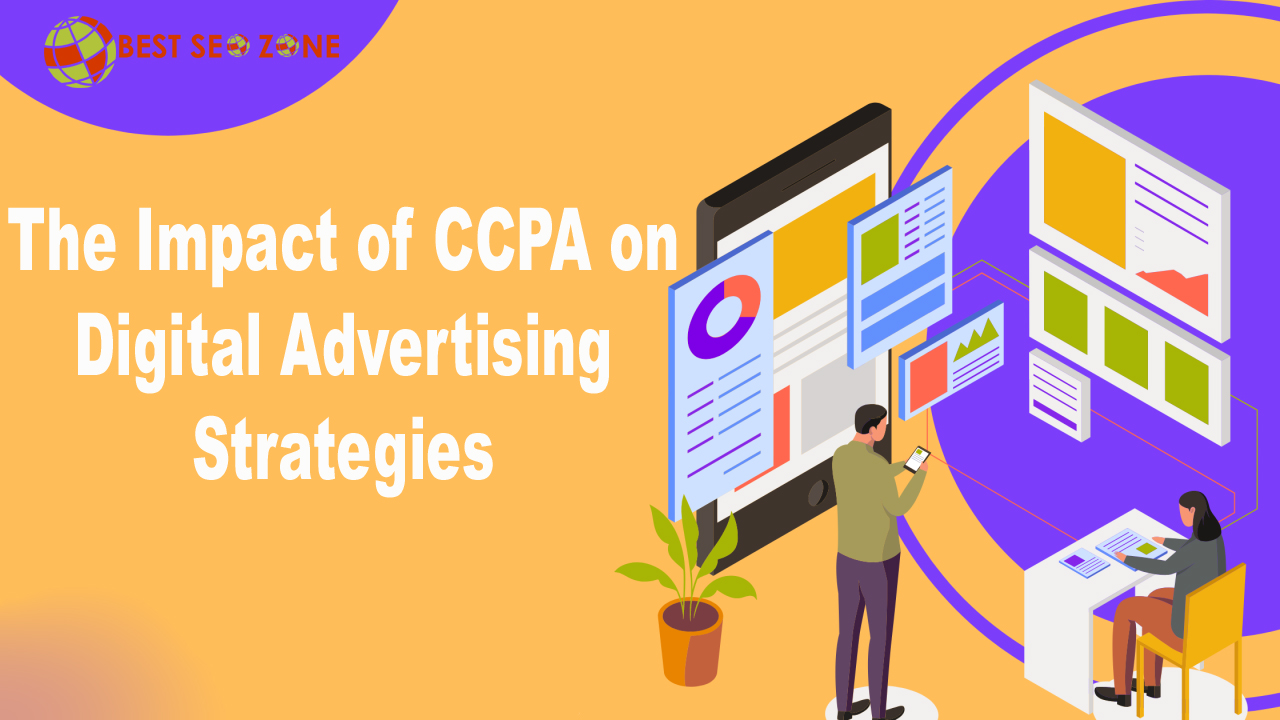Digital advertising has become crucial to how businesses connect with their audiences. It is all about using the internet to tell people about products and services aiming to get their attention and encourage them to buy or engage. However, a new law called the California Consumer Privacy Act (CCPA) has started to change how companies can advertise online. This law gives people more control over their personal information affecting the way businesses collect data and target their ads.
The CCPA has made a big splash in digital advertising forcing companies to rethink their strategies. Since the law focuses on protecting the privacy of individuals advertisers now have to be very careful about how they gather and use data. They must be more open about what they are doing and allow people to say no to their data being sold. This shift towards transparency and respect for privacy is reshaping the digital advertising landscape creating new challenges but also opening up new opportunities for businesses to connect with their customers in a more meaningful way.
Table of Contents
Understanding CCPA A Brief Overview

The California Consumer Privacy Act (CCPA) is a law that was made to protect the privacy of people living in California USA. It started in 2020 and gives Californians more control over the personal information that companies collect about them. Under this law, people can ask companies to show them what data they have on them delete their data, or not sell their data to others. This is a big deal because it means businesses have to be very clear about what they are doing with people’s information and make sure they have permission to use it. So if you live in California and you do not want a company to keep or share your data CCPA gives you the power to say so. This law is especially important in today’s digital world where so much of our personal information is online and it aims to make sure that this information is kept safe and used responsibly.
The Shift in Digital Advertising Strategies Due to CCPA

Increased Emphasis on Transparency and Consumer Consent
Since the CCPA came into play businesses have had to be much clearer about how they handle people’s personal information. Now they need to tell you exactly what data they are collecting why they are collecting it and who else might get to see it. They also have to ask for your permission before they can collect or share your data. This means that when you visit a website you might see more notices or pop-ups asking you to agree to their data collection practices. This change is all about making sure you know what is happening with your information and giving you the power to decide whether you are okay with it. It is a big step towards making the digital world more open and respectful of everyone’s privacy.
The Rise of First Party Data Collection
With the CCPA affecting how businesses can collect and use people’s data, many companies are now focusing more on first-party data collection. First-party data is information that businesses gather directly from their customers or website visitors like what pages you visit on their site or what you buy from them. This shift is happening because under CCPA it is easier and safer for businesses to use data they collect themselves rather than buying or sharing data with other companies. By relying on first-party data businesses can still personalize your experience and show you ads or products that might interest you but they do so in a way that is more transparent and under your control. This approach helps build trust between you and the company since you know exactly where your data is coming from and why it is being used.
Enhanced Focus on Privacy First Advertising Technologies
Since the CCPA made privacy a big deal companies have started using new kinds of advertising technologies that respect your privacy more. These technologies are designed to show you ads without needing to know too much about you. For example instead of tracking everything you do online to show you targeted ads some companies might now use a method called contextual advertising. This means they show you ads based on the content you are looking at right now like showing you sneaker ads on a sports website without knowing anything else about you. This way you still get to see relevant ads but your personal information stays private. It is all about finding smarter ways to advertise that do not intrude on your privacy making the internet feel safer and more respectful of everyone’s personal space.
The Challenge of Balancing Personalization with Privacy
Balancing personalization with privacy is like trying to have the best of both worlds. On one side we all like it when things feel personal and tailored just for us like when a website recommends a movie we end up loving. On the other side, we do not want to give away too much about ourselves just to get those recommendations. Since the CCPA came along businesses have been working hard to figure out how to make their services feel personal without crossing the line into being too nosy. It is a tricky balance because they need enough information to make good guesses about what you might like but they also have to make sure they are not invading your privacy. This challenge is pushing companies to come up with clever respectful ways to understand their customers’ needs without asking for too much personal information or making people feel uncomfortable.
Navigating Compliance While Maintaining Effective Advertising

Navigating compliance while maintaining effective advertising is a bit like walking a tightrope for businesses these days. They have to carefully follow all the rules set by laws like the CCPA which means making sure they respect people’s privacy and handle their data correctly. At the same time, they still want to show ads that are interesting and relevant to people so they keep buying products or services. This can be tough because using less personal data might make ads less personal and that could mean people are less likely to pay attention to them. To stay on the tightrope businesses are getting creative. They are finding new ways to collect and use data that people are okay with. They are also investing in technology that helps them understand what customers want without getting too personal. Plus they are focusing more on building trust with customers by being open about what data they are collecting and why. All this effort is about finding a middle ground where businesses can still reach out to potential customers in a meaningful way without stepping over privacy boundaries.
Challenges & Solutions
Challenges
- CCPA imposes strict regulations on the collection and use of consumer data, making it challenging for advertisers to gather and utilize personal information.
- CCPA requires businesses to be transparent about data practices, making it necessary to provide clear information about data usage and give consumers the option to opt-out.
- Managing opt-out requests becomes more complex under CCPA, and ensuring compliance with user preferences is a continuous challenge.
- The CCPA emphasizes the need for businesses to implement reasonable security measures to protect consumer data.
- Advertisers may face limitations in their ability to target specific audiences due to restricted access to certain types of consumer data.
Solutions
- Focus on obtaining explicit consent from users before collecting their data. Implement robust opt-in mechanisms and clearly communicate the value proposition to encourage users to share their information willingly.
- Update privacy policies and ensure that information regarding data practices is easily accessible. Implement user-friendly interfaces that allow consumers to manage their preferences easily.
- Invest in robust systems to track and honor opt-out requests promptly. Regularly audit and update your systems to align with the latest compliance standards.
- Prioritize data security by implementing encryption, regular security audits, and compliance with industry-standard security protocols. This not only aligns with CCPA but also enhances consumer trust.
- Rely on alternative targeting methods, such as contextual advertising, which doesn't rely on personal information but rather the context of the content being viewed. Invest in AI and machine learning technologies to optimize targeting based on broader patterns and behaviors.
Adapting to the New Norm
The CCPA has shaken up the world of digital advertising. It has made companies think harder about how they collect and use people’s data pushing them towards more privacy-friendly ways of reaching out to potential customers. While this has introduced some challenges like figuring out how to make ads feel personal without invading privacy it has also opened up opportunities for businesses to build stronger more trusting relationships with their audiences. By focusing on transparency respecting privacy and finding creative ways to engage people companies can still run effective advertising campaigns under the new rules. The journey to balance privacy with personalization is not easy but it is leading to a digital advertising world that cares more about the individuals respects their choices and still delivers the content and products they love. This shift might require some adjustment but ultimately it is a step towards a more respectful and user-friendly digital landscape.
FAQs
What is CCPA and why does it matter for digital advertising?
CCPA stands for the California Consumer Privacy Act. It is a law that gives people more control over their personal information. For digital advertising, it matters because it changes how companies can collect and use data for ads. Now they need to be more open about what they are doing and get permission from people before using their data for advertising.
How does CCPA change the way companies collect data?
Under CCPA companies have to tell you what data they are collecting and why. They also need your permission to sell your data. This means they can not just gather information about you without letting you know. So companies are moving towards collecting data directly from you (first-party data) in a way that is more transparent and respects your privacy choices.
Can I still receive personalized ads under CCPA?
Yes, you can still receive personalized ads under CCPA but the way these ads are personalized might change. Companies are finding new ways to offer personalized content without using sensitive personal information. This could mean seeing ads based on the content of the page you are viewing (contextual advertising) rather than your personal browsing history.
What are companies doing to comply with CCPA while still advertising effectively?
Companies are getting creative to balance compliance with effective advertising. They are investing in technologies that allow for privacy expecting personalization and focusing more on first-party data. They are also being more transparent with customers about data practices which can help build trust and potentially make people more open to sharing their data.
How can I control the use of my data under CCPA?
Under CCPA you have the right to know what personal data is being collected about you the purpose of its collection and who it is being shared with. You can ask companies to delete your data or opt out of having your data sold to third parties. Look for privacy notices and “Do Not Sell My Personal Information” links on websites to exercise your rights.

Waqas Mushtaq is the Co-founder and CTO of Best SEO Zone which is a prominent digital marketing agency based in Pakistan Since 2010. He is a professional Freelancer who has completed successfully 400+ projects of website development & Digital Marketing.




